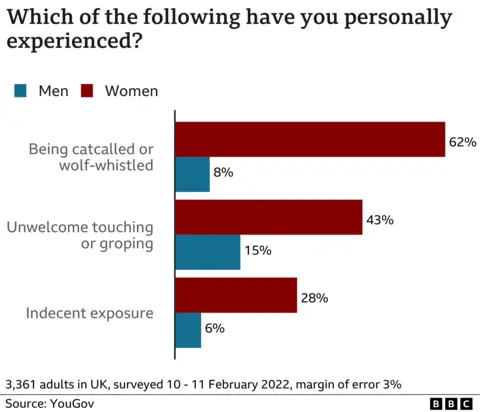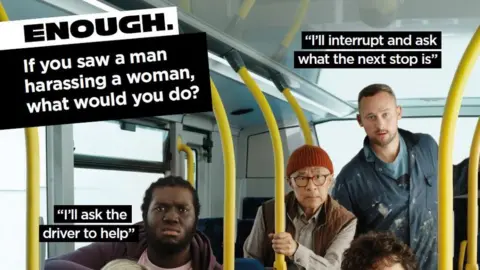Street harassment to be banned in crackdown, government says
Sexual harassment on the street will be made a crime with jail sentences of up to two years, the government has said.
Catcalling, following someone and blocking their path will be criminalised in England under plans backed by the Home Secretary.
"Every woman should feel safe to walk our streets," Suella Braverman said.
Sexual harassment is already illegal but it is hoped creating a new offence for street harassment will encourage more people to report it to police.
"We are putting the needs of victims at the heart of our decision, which will mean the criminals who commit these acts face the consequences they deserve," Ms Braverman said.
A survey by pollsters YouGov for the BBC, published in March, suggested two-thirds of women did not feel safe walking alone at night, at least some of the time.
Females under 34 are most likely to be the target of sexual offences but the least likely to report them, according to the Crown Prosecution Service (CPS).
The Crown Prosecution Service, which decides whether to take cases to court, recently updated its advice to staff about street harassment. The new guidelines also cover offences like exposure, stalking and sexual assault.
The murder of Sarah Everard, who was abducted and killed by a serving policeman while walking home in south London last year, has also increased concerns over women's safety and attitudes towards women.
Six months later, primary school teacher Sabina Nessa, 28, was murdered in south London by a man she had never met.

The government will now back legislation tabled by former business secretary Greg Clark.
Mr Clark said the intention of the bill is "to reinforce a change in the culture that establishes that it is completely unacceptable to abuse women in the streets".
During a debate in the House of Commons, Mr Clark said: "Public sexual harassment can affect men and boys, but we should be clear that it disproportionately affects women and girls."
The backbencher's bill aims to criminalise:
- Deliberately walking closely behind someone as they walk home at night
- Making obscene or aggressive comments towards a person
- Making obscene or offensive gestures towards a person
- Obstructing a person's path
- Driving or riding a vehicle slowly near to a person making a journey
As it stands, the bill will also introduce harsher sentences - increasing the maximum sentences from six months to two years.
Campaigners have also called for wolf-whistling and staring intently to be criminalised.
In July, then home secretary Priti Patel launched a consultation on making street harassment a specific crime. The Home Office has now concluded it should be introduced after "the significant majority" of respondents were in favour.
Earlier this year, the Independent Government Adviser for Tackling Violence Against Women and Girls, Nimco Ali claimed the government had blocked the legislation.
Labour's shadow home secretary, Yvette Cooper, welcomed the government backing a new law.
She said: "Any action to tackle the epidemic of violence against women and girls is welcome, but the government must now go further and faster."
 Home Office
Home OfficeThe Home Office - the government department in charge of policing - recently launched a campaign encouraging people to call out harassment.
It's called Enough and you might have seen posters for it popping up on public transport over the past month or so.
The adverts - mainly aimed at men - suggest ways for people to intervene if they see someone being harassed.
